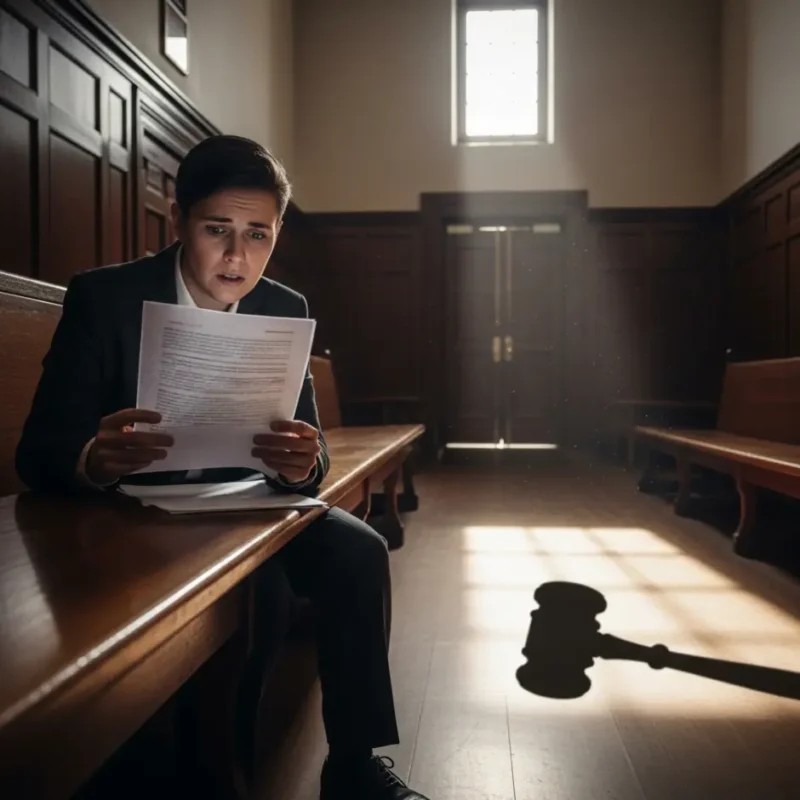What Happens If I Miss My Court Date?

Missing a scheduled court date—often called a “failure to appear” (FTA)—is a serious matter that can lead to significant legal consequences. Courts rely on timely appearances to keep the justice system running smoothly, and failing to show up signals disregard for the legal process. Depending on the type of case, missing a court date may result in fines, license suspension, arrest warrants, or even additional criminal charges. Understanding what happens if you miss your court date—and what steps you can take to fix the situation—can help you minimize damage and protect your rights.
Understanding a Failure to Appear (FTA)
A Failure to Appear (FTA) occurs when a person does not attend a scheduled court hearing after being properly notified. Courts treat attendance as a legal obligation, and failing to appear is considered a violation of court orders. While some people miss court dates due to emergencies or honest mistakes, the justice system rarely distinguishes between intentional and unintentional absences without supporting evidence.
Legal Definition
- Criminal Cases: In criminal proceedings, missing court is especially serious. It may result in additional criminal charges, such as contempt of court or bail jumping.
- Civil Cases: In civil disputes (like debt collection or small claims), failure to appear often results in a default judgment against the absent party.
- Traffic Violations: Ignoring a traffic court date can lead to automatic fines, license suspension, and possible arrest warrants.
Why Courts Treat It Seriously
- Efficiency of the System: Courts schedule cases carefully. Missing court wastes resources and delays justice.
- Respect for Authority: Attending court is not optional—it is a legal duty.
- Ensuring Accountability: For criminal cases, presence ensures that defendants are held accountable for pending charges.
Distinguishing FTA from Rescheduling
- If you have a valid reason for not attending (such as hospitalization), you may be able to reschedule your hearing.
- Courts generally require proof of the emergency and immediate communication to avoid penalties.
- Simply forgetting or choosing not to attend almost always results in negative legal consequences.
Example Scenario
- Criminal Case: A defendant charged with DUI misses their arraignment. The judge immediately issues a bench warrant, meaning police can arrest them at any time.
- Civil Case: A tenant fails to show up in landlord-tenant court. The judge enters a default judgment in favor of the landlord, leading to eviction.
Bottom Line
An FTA is not a minor issue—it signals to the court that you are ignoring legal obligations. Even if missing court was unintentional, consequences are swift and serious unless you act quickly to correct the situation.
Immediate Legal Consequences of Missing Court
When you miss a scheduled court date, consequences can begin immediately—often on the very same day. Courts do not wait for long explanations or excuses before taking action, because attendance is treated as a fundamental obligation.
Bench Warrant Issued
- In criminal and traffic cases, judges frequently issue a bench warrant as soon as you fail to appear.
- This authorizes law enforcement to arrest you on sight, whether at a traffic stop, your workplace, or even your home.
- Once arrested, you may be taken directly to jail and held until your new court date.
Loss of Bond or Bail
- If you were released on bail or bond, failing to appear typically results in forfeiture.
- Bail money posted may be lost, and bondsmen may pursue you to recover their financial loss.
- In many cases, you will not be eligible for bail again, or the amount may increase significantly.
Default Judgment in Civil Cases
- In civil matters, such as lawsuits, debt collections, or family court disputes, the judge may issue a default judgment against you.
- This means the opposing party automatically wins, regardless of your side of the story.
- Consequences may include wage garnishment, asset seizure, or unfavorable rulings on custody or property.
Additional Criminal Charges
- Some jurisdictions treat missing court as a separate offense, such as contempt of court or failure to appear.
- These charges may lead to fines, probation, or even jail time on top of your original case.
Example Scenario
A driver with a pending speeding ticket ignores their court summons. On the day of the hearing, the judge issues a bench warrant. Days later, the driver is pulled over for a minor traffic violation, and the outstanding warrant results in immediate arrest and vehicle impoundment.
Why Courts Act Quickly
- The justice system depends on predictability and compliance.
- Delays waste court resources and undermine enforcement.
- Quick penalties for missed court dates discourage others from disregarding their obligations.
Bench Warrants and Arrest Risks
One of the most serious consequences of missing a court date is the issuance of a bench warrant. Unlike an arrest warrant, which is typically issued after a criminal investigation, a bench warrant is ordered directly by a judge because you failed to appear as required. Once issued, it places you at immediate risk of arrest until the warrant is resolved.
What Is a Bench Warrant?
- A bench warrant is a judicial order instructing law enforcement to arrest you and bring you before the court.
- It does not expire and remains active until resolved, meaning you could be arrested weeks, months, or even years later.
- These warrants often apply to criminal, traffic, and even some civil proceedings.
How Arrests Happen
- Traffic Stops: If police pull you over for a minor violation and run your information, the bench warrant will appear, leading to arrest.
- Home or Work Arrests: In more serious cases, officers may actively seek you out at your residence or workplace.
- Airport or Border Crossings: Warrants often appear in national databases, which can result in arrest when traveling.
Immediate Consequences of Arrest
- You may be taken directly to jail and held until you can appear before a judge.
- Bail, if granted again, is usually higher—or denied altogether—because the court sees you as a flight risk.
- Your case may become more complicated, with added charges such as failure to appear or contempt of court.
Example Scenario
A defendant charged with misdemeanor theft misses their arraignment. The judge issues a bench warrant. Months later, the defendant is stopped for running a red light. The officer runs their name, sees the outstanding warrant, and arrests them on the spot, leading to unexpected jail time.
Why Bench Warrants Are Serious
- They remain in effect indefinitely.
- They can turn a manageable case into a far more serious situation.
- They severely damage credibility with the court, making judges less lenient in future proceedings.
Fines, Fees, and Additional Penalties
Missing a court date often comes with financial consequences on top of legal risks. Courts impose fines and fees to emphasize the seriousness of non-compliance and to cover the administrative costs of rescheduling and enforcement. These penalties can quickly add up, especially if the case already involves criminal charges or traffic violations.
Court Fines
- Many jurisdictions automatically impose a fine for Failure to Appear (FTA).
- The amount varies by state and case type but can range from $100 to over $1,000.
- These fines are separate from any penalties related to the underlying case.
Late Fees and Administrative Costs
- Courts may charge administrative fees for missed appearances.
- If your case must be rescheduled, you may also face rescheduling costs.
- In traffic cases, unpaid fines and missed hearings can trigger collection fees or additional surcharges.
Additional Penalties in Criminal Cases
- Contempt of Court: Missing a criminal court date can lead to contempt charges, carrying fines and possible jail time.
- Enhanced Sentences: Judges may impose harsher penalties at sentencing if they view your absence as showing disrespect for the court.
- Bond Forfeiture: If bail or bond was posted, missing court usually results in losing that money permanently.
Civil Case Consequences
- In civil cases, fines are less common, but missing court often results in a default judgment.
- This judgment may include financial penalties, interest, and attorney’s fees for the opposing party.
Example Scenario
A driver in Georgia fails to appear for a traffic violation hearing. The court imposes a $500 fine for failure to appear, adds administrative fees, and suspends their license until the fines are paid. When combined with the original speeding fine, the total cost exceeds $1,200.
Why These Penalties Matter
Fines and fees from missed court dates can snowball into larger financial burdens. A single missed appearance can result in:
- Lost bail money,
- Default judgments,
- License suspensions, and
- Collection actions.
Even if jail time is avoided, the financial weight of missing court can follow you for years.
Impact on Criminal vs. Civil Cases
Missing a court date has consequences in both criminal and civil cases, but the severity and nature of those consequences differ significantly. Understanding the distinction helps clarify what’s at stake depending on the type of case.
Criminal Cases
- Bench Warrants: In almost every criminal case, missing a court date triggers an immediate bench warrant for arrest.
- Additional Charges: Many states add a separate offense of Failure to Appear (FTA), which can be classified as a misdemeanor or felony depending on the seriousness of the original charge.
- Bail/Bond Forfeiture: Any bail posted is usually forfeited, and the court may set a much higher bail if you are arrested again.
- Sentencing Impact: Judges often impose harsher penalties on defendants who miss hearings, interpreting it as a lack of responsibility or intent to evade justice.
Civil Cases
- Default Judgment: The most common outcome of missing a civil hearing is that the opposing party automatically wins. This means the judge enters judgment in favor of the other side without hearing your defense.
- Financial Consequences: A default judgment can result in wage garnishment, property liens, or direct collection actions.
- Loss of Claims or Rights: If you are the plaintiff (the person filing the case), missing court may mean dismissal of your lawsuit, effectively ending your chance at relief.
Traffic and Minor Violations
- License Suspension: Missing traffic court often leads to automatic license suspension, even for minor infractions.
- Additional Fines: Courts may add fines and late fees on top of the original ticket amount.
Example Scenarios
- Criminal: A defendant charged with burglary misses a court date. A bench warrant is issued, bail is forfeited, and when the defendant is eventually arrested, the prosecutor adds a felony failure to appear charge.
- Civil: A tenant misses an eviction hearing. The landlord automatically wins a default judgment, leading to eviction and financial liability for back rent.
Key Difference
In criminal cases, missing court often leads to arrest and additional charges, while in civil cases, it usually results in losing by default. Both outcomes can have long-lasting impacts, but criminal FTAs are far more severe and difficult to recover from.
Driver’s License Suspension for Missing Court
One of the lesser-known but very common consequences of missing a court date is the suspension of your driver’s license. Courts and state motor vehicle departments use license suspensions as a tool to enforce compliance, particularly in traffic and misdemeanor cases.
How License Suspension Works
- Automatic Notification: When you miss court for a traffic violation or related matter, the court notifies the Department of Motor Vehicles (DMV) or its state equivalent.
- Immediate Suspension: The DMV may suspend your license until you resolve the case, regardless of whether you are later convicted of the underlying offense.
- Conditional Reinstatement: In most states, you must pay fines, attend court, and sometimes pay reinstatement fees before your license is restored.
Cases Where Suspension Happens
- Traffic Violations: Failing to appear for speeding tickets, reckless driving charges, or other moving violations almost always results in suspension.
- Failure to Pay Fines: If fines from earlier cases remain unpaid, missing court may trigger suspension as an enforcement measure.
- Missed Criminal Hearings: In some states, even misdemeanor cases unrelated to driving can cause suspension if court appearances are missed.
Duration of Suspension
- Varies by State: Some suspensions remain in place indefinitely until the case is cleared. Others may have fixed terms (e.g., 6 months to 1 year).
- Repeat Offenses: Multiple failures to appear can result in progressively harsher suspensions and longer reinstatement processes.
Collateral Consequences
- Insurance Premiums: License suspensions cause auto insurers to label drivers as high-risk, leading to steep premium hikes.
- Employment Issues: Jobs requiring a valid license (delivery, trucking, rideshare) may be lost.
- Legal Risk: Driving with a suspended license is itself a criminal offense, often punishable by fines or jail time.
Example Scenario
A driver in North Carolina ignores a court summons for an unpaid speeding ticket. The court notifies the DMV, which suspends the driver’s license indefinitely. The driver cannot reinstate the license until they attend court, pay fines, and cover reinstatement fees.
Why This Matters
License suspension turns a missed court date into a daily burden—limiting mobility, threatening employment, and creating new legal risks if you drive without reinstating your privileges.
How Missing Court Affects Bail or Bond
If you have been released on bail or bond while awaiting trial, failing to appear in court can have serious and immediate financial and legal consequences. Courts treat non-appearance as a breach of the agreement that allowed your release, and the fallout often affects both you and anyone who helped secure your bond.
Bail and Bond Basics
- Bail: Money paid directly to the court to guarantee your appearance.
- Bond: A contractual agreement with a bail bondsman, who posts bail on your behalf for a non-refundable fee (usually 10–15%).
Both systems are designed to ensure you return to court. Missing court undermines that purpose.
Consequences of Missing Court While on Bail
- Forfeiture of Bail Money: If you paid cash bail, you lose it entirely. Even if you later return to court, the court may refuse to refund the money.
- Bench Warrant Issued: Judges almost always issue a bench warrant after missed appearances by individuals on bail.
- Harsher Bail Terms: If bail is re-granted after arrest, the amount will likely be much higher. In some cases, judges may deny bail altogether.
Consequences of Missing Court While on Bond
- Bond Forfeiture: The court requires the full bail amount from the bail bondsman.
- Bondsman Action: To recover their loss, bondsmen may employ bounty hunters or agents to locate and return you to custody.
- Collateral Seizure: If family or friends used collateral (like property or vehicles) to secure the bond, they may lose it permanently.
Additional Legal Risks
- Failure to Appear Charge: Missing court while on bail or bond can result in additional charges, often felonies if the original case was serious.
- Loss of Future Bail Privileges: Courts may refuse to release you on bail in future cases, citing you as a flight risk.
Example Scenario
A defendant in Texas is released on a $10,000 bond after a DUI arrest. They fail to appear for their hearing. The court demands the full bail amount from the bondsman, who then sends a bounty hunter to apprehend the defendant. The defendant is re-arrested, loses the bond, and faces an additional charge for failure to appear.
Why This Is Significant
Missing court doesn’t just affect your current case—it destroys your financial resources, jeopardizes your support system, and makes future pre-trial release nearly impossible.
Long-Term Consequences of an FTA Record
A Failure to Appear (FTA) record can have consequences that extend well beyond the immediate fines, warrants, or license suspensions. Once recorded, it becomes part of your official history and may affect multiple aspects of your life for years to come.
Criminal Record Impact
- Permanent Mark: In many states, an FTA becomes part of your criminal record, even if the underlying charge is later dismissed.
- Enhanced Sentencing: Judges often consider past FTA records when determining bail, probation, or sentencing in new cases.
- Repeat Offenses: Multiple FTAs demonstrate a pattern of non-compliance, resulting in harsher penalties in future legal proceedings.
Employment and Background Checks
- Employer Scrutiny: Many employers run background checks. An FTA can appear as a red flag, suggesting unreliability or disregard for legal obligations.
- Professional Licenses: Certain professions—such as law, healthcare, or finance—require clean legal records. An FTA can disqualify applicants from licensing.
- Government Jobs: Public sector employment, particularly in law enforcement or public safety, may be denied due to an FTA history.
Immigration Consequences
- For non-citizens, failing to appear in court can carry immigration consequences, especially in cases involving visas, permanent residency, or deportation proceedings.
- Immigration judges may treat an FTA as evidence of poor moral character, complicating applications for lawful status or naturalization.
Credit and Financial Issues
- Civil Judgments: In civil cases, a default judgment resulting from an FTA can damage your credit score and lead to garnishments or liens.
- Collections: Court-ordered fees and fines for missing appearances may be sent to collections, further harming financial standing.
Social and Personal Impact
- Trust and Reputation: An FTA record may damage personal and professional relationships, particularly if others posted bail or bond on your behalf.
- Restricted Travel: Active warrants resulting from FTAs can limit travel, especially internationally, as border agencies often check warrant databases.
Example Scenario
A defendant misses a court date for a minor drug charge. Even after resolving the case later, the FTA remains on their record. Years later, while applying for a professional license, the reviewing board denies approval, citing concerns over responsibility and legal compliance.
What to Do If You Missed a Court Date
Missing a court date can feel overwhelming, but ignoring the situation only makes it worse. Acting quickly and strategically is the best way to minimize the damage and possibly avoid the harshest penalties.
Step 1: Contact the Court Immediately
- Call or visit the court clerk’s office as soon as you realize you missed your appearance.
- In many cases, the court will allow you to reschedule or place your case back on the calendar.
- The longer you wait, the more likely additional penalties—like warrants or fines—will be enforced.
Step 2: Check for a Bench Warrant
- If a warrant has already been issued, confirm its status.
- Some jurisdictions allow you to self-surrender to avoid being arrested unexpectedly.
- Contacting a lawyer before turning yourself in can help negotiate better terms, like avoiding jail while waiting for a new court date.
Step 3: Hire or Contact Your Attorney
- An attorney can file a motion to recall the warrant or request that the court quash it.
- They can also argue mitigating circumstances (such as illness or family emergencies) to reduce penalties.
- If you do not already have a lawyer, this is the time to get one—especially for criminal or serious civil matters.
Step 4: Gather Proof of Your Excuse
- Courts are more forgiving if you can show good cause for missing court. Examples include:
- Medical emergencies (hospital records, doctor’s notes).
- Transportation issues (tow receipts, accident reports).
- Miscommunication (incorrect court notice, clerical errors).
- Always bring documentation to support your claim.
Step 5: Appear Voluntarily at the Next Opportunity
- Showing up voluntarily demonstrates good faith.
- Courts are often more lenient with individuals who take responsibility quickly instead of waiting to be arrested.
Example Scenario
A person misses their small claims court date due to a car accident. The next day, they call the court, explain the situation, and provide accident records. Instead of entering a default judgment, the judge reschedules the hearing, avoiding long-term consequences.
Why Acting Quickly Matters
- Warrants do not disappear on their own.
- Fines and license suspensions grow worse with time.
- By contacting the court promptly and showing responsibility, you can often limit the damage of missing a court date.
Final Thoughts on Avoiding Court Absences
Missing a court date is never a small issue. Even when the original case seems minor, failing to appear signals to the judge that you are not taking the legal process seriously. The results can spiral quickly—bench warrants, license suspensions, financial penalties, and long-term damage to your record.
Why Attendance Matters
- Respect for the Court: Courts view appearance as a legal duty, not a personal choice.
- Case Outcome: Simply showing up can be the difference between defending yourself and automatically losing your case.
- Avoiding Escalation: Attending court prevents minor issues (like traffic tickets) from escalating into warrants or criminal charges.
Building Good Habits
- Calendar Alerts: Always mark court dates on multiple calendars (phone, email, paper).
- Legal Representation: Attorneys can remind you of deadlines and sometimes appear on your behalf in certain cases.
- Transportation Planning: Arrange transportation in advance and allow extra time for delays.
- Emergency Backup: Have a contact person who can assist if unexpected issues arise.
When Life Gets in the Way
Courts recognize that emergencies happen. The key is communication. If you cannot attend, notify the court immediately and provide proof. Judges are often more forgiving when people show responsibility and honesty rather than ignoring the summons altogether.
Long-Term Perspective
- A single missed court date can have years of consequences on your record, career, and finances.
- Conversely, consistent attendance builds credibility, showing the court that you are responsible and cooperative.
- Even if the outcome of your case isn’t favorable, avoiding an FTA keeps you in control of the process.
In short, attending court is not just a requirement—it is a strategy for protecting your future. When in doubt, prioritize court appearances above all else and take proactive steps to ensure you never miss one.
Frequently Asked Questions (FAQs)
1. What happens if I accidentally miss my court date?
Even if it was accidental, the court may issue a bench warrant or impose fines. Contact the court immediately to explain and reschedule.
2. Can I go to jail for missing a court date?
Yes. In criminal cases, missing court often leads to a bench warrant and potential jail time.
3. What is the difference between a bench warrant and an arrest warrant?
An arrest warrant is issued after a criminal investigation, while a bench warrant is issued by a judge when someone fails to appear in court.
4. Will missing a civil court date also result in a warrant?
Not usually. In civil cases, the consequence is typically a default judgment in favor of the other party rather than a warrant.
5. Can I reschedule a court date if I know I can’t attend?
Yes. You should contact the court in advance to request a continuance. Judges are more flexible if you communicate early.
6. How long does a bench warrant stay active?
Indefinitely. A bench warrant does not expire until you resolve it with the court.
7. Will missing court affect my driver’s license?
Yes, especially for traffic-related cases. Many states automatically suspend your license if you fail to appear.
8. What should I do if a warrant has already been issued?
Contact an attorney and consider self-surrendering to the court to avoid an unexpected arrest.
9. Can my lawyer appear in court for me?
In some cases, yes—particularly for minor charges or civil hearings. However, serious criminal cases usually require your presence.
10. How can I prevent missing a court date in the future?
Use calendar reminders, communicate with your attorney, and notify the court immediately if an emergency arises.






